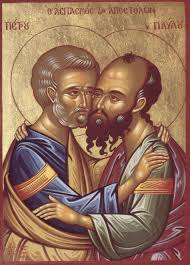
On June 29 we celebrate the feast of the Apostles Peter and Paul. The usual icon for the feast shows them united, embracing in a kiss of peace. But they were not always at peace. In fact, in this icon I think they look as if they could be a bit happier with each other!
Peter
I’m sure you’ve figured this out already: “Blessed are you, Simon bar Jonah” – Simon, son of John, “Johnson”. “I say to you: you are Peter (which means Rock *)” Matthew 11:18 Peter was “Rocky Johnson”. This tells us what we really need to know about him. The Holy Apostle Peter was an “uneducated fisherman” as we sing – an ordinary guy.
* “Rock” in New Testament Greek is “Petros”, ο πέτρος.
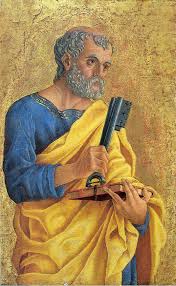 Simon Peter was from Galilee the northern Jewish province, a small town/rural area. If Paul was from Milwaukee, Peter was from “up in the north woods”, as we say down here in southern Wisconsin. We know nothing of his background. He had no special education so far as we know, but don’t think he was a simpleton. Synagog school was usual for Jewish boys by then. Galilee was mostly Jewish, but there were also many Gentiles, so most men knew three languages: Aramaic the popular tongue, Hebrew for worship and Greek the language of the eastern Empire. Besides, much wisdom can be found among those who deal with the natural world. Still he was a laborer, a “Rocky Johnson” type. He later wrote only two short Epistles included in our New Testament.
Simon Peter was from Galilee the northern Jewish province, a small town/rural area. If Paul was from Milwaukee, Peter was from “up in the north woods”, as we say down here in southern Wisconsin. We know nothing of his background. He had no special education so far as we know, but don’t think he was a simpleton. Synagog school was usual for Jewish boys by then. Galilee was mostly Jewish, but there were also many Gentiles, so most men knew three languages: Aramaic the popular tongue, Hebrew for worship and Greek the language of the eastern Empire. Besides, much wisdom can be found among those who deal with the natural world. Still he was a laborer, a “Rocky Johnson” type. He later wrote only two short Epistles included in our New Testament.
Paul
The Apostle Paul (Saul was his Hebrew name) was an urbane sophisticate. He was from a notable family of Tarsus, honored through their father with the title “citizen of Rome”. Paul had received the finest education in Jerusalem under the famous rabbi Gamaliel.
Paul was from the diaspora, Jews who had lived out in the Greek world since the destruction of Jerusalem by the Babylonians, centuries before. He was from Tarsus, a major city (2019 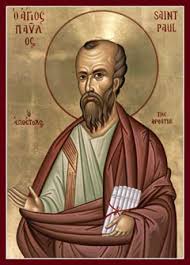 metropolitan area population: about 3 million) and cultural center on the south coast of Asia Minor (now Turkey). Roman citizenship was a rare honor in those days, which gave Paul the legal rights of an actual resident of the city of Rome. He could appeal to Caesar for justice – as he did, which meant in the end he could be beheaded quickly instead of crucified slowly. As late as the martyrdom of Stephen Saul was still “a young man” Acts 7:58, a strict Pharisee who kept Old Testament Law to the letter, so zealous that when this “heretical” Christian movement began he was out to get them. When Christians fled Jerusalem he got permission to go to Damascus and bring them back for trial. Paul – zealous, sophisticated, intellectually brilliant, a “thinker”. Remarkably quickly he grasped the profound implications of Christ’s Incarnation, and would write much of our New Testament.
metropolitan area population: about 3 million) and cultural center on the south coast of Asia Minor (now Turkey). Roman citizenship was a rare honor in those days, which gave Paul the legal rights of an actual resident of the city of Rome. He could appeal to Caesar for justice – as he did, which meant in the end he could be beheaded quickly instead of crucified slowly. As late as the martyrdom of Stephen Saul was still “a young man” Acts 7:58, a strict Pharisee who kept Old Testament Law to the letter, so zealous that when this “heretical” Christian movement began he was out to get them. When Christians fled Jerusalem he got permission to go to Damascus and bring them back for trial. Paul – zealous, sophisticated, intellectually brilliant, a “thinker”. Remarkably quickly he grasped the profound implications of Christ’s Incarnation, and would write much of our New Testament.
Other Differences
Not only did the two have different backgrounds, they also had very different temperaments – Peter impulsive, quick to speak and act, while Paul was more the intellectual, inclined to think first. Also they became Apostles in quite different ways, so much so that it took a while for Peter and the others to accept Paul as genuine.
Peter had known Jesus personally. He and his brother Andrew were mending the nets by the Sea of Galilee when Christ called them to follow him and be fishers of men. So Peter had walked with the Lord from the very beginning – had seen his miracles, absorbed his teachings, was first to confess him as “the Christ, Son of the living God”. He was leader of the Apostles. Peter had suffered through Holy Week and the Crucifixion, had seen the Resurrection, was first into the tomb on Pascha morning – and then was sent out to the world by Christ himself.
Paul was a latecomer, the “new kid on the block”. Not only had he not walked with Christ, he had persecuted Christians, till on the road to Damascus he had a vision of the risen Lord who said “Saul, Saul why are you persecuting me?” That, by the way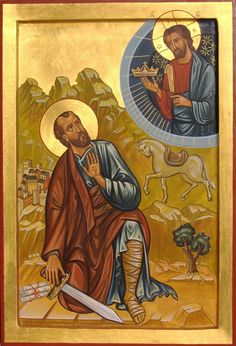 , is surely why he so emphasized the Church as the Body of Christ, for Christ himself had told him that by persecuting the Church Paul had been persecuting him. Paul insisted he had been called by the Lord to be Apostle to the Gentiles.
, is surely why he so emphasized the Church as the Body of Christ, for Christ himself had told him that by persecuting the Church Paul had been persecuting him. Paul insisted he had been called by the Lord to be Apostle to the Gentiles.
You can imagine the reaction of the original Apostles: Who does this guy think he is? This is surely the chief reason why Paul often sounds defensive about his Apostleship, sometimes even feisty. (Read the Epistle for the feast: 2 Corinthians 11:21-33; 12:1-9.) And I can’t help wondering if Paul originally had some of the airs of the educated urbane sophisticate: What do these fishermen know about theology? However three years after his calling Paul humbly went up to Jerusalem to convince Peter and James, the “pillars of the Church” as he calls them, that his teaching agreed with theirs. Galatians 1:18-19 It did.
Paul proved himself not so much by what he said as by what he did. Paul walked the walk. Peter and the others accepted him, and he was the most effective missionary of the early Church.
The Biggest Difference
But first the two Apostles had to get past a major disagreement about how to apply the Gospel.
Peter was the “conservative”. He believed everyone needed to do it the way the the earliest Jewish Christians were doing it: first people should become Jews and accept the Old Testament Law, and then in addition they could believe in Jesus as the Messiah. Paul was the “liberal” – from their point of view he was radical. Paul, formerly the strictest of Pharisees, now said the Old Testament Law could be left behind. Christ had fulfilled, completed the Law. Gentiles need not be circumcised or keep kosher meals. All they needed was faith in Jesus Christ and to be baptized into the Church. Paul prevailed.
Peter had a strange vision one day which directed him to go to the home of a Gentile, 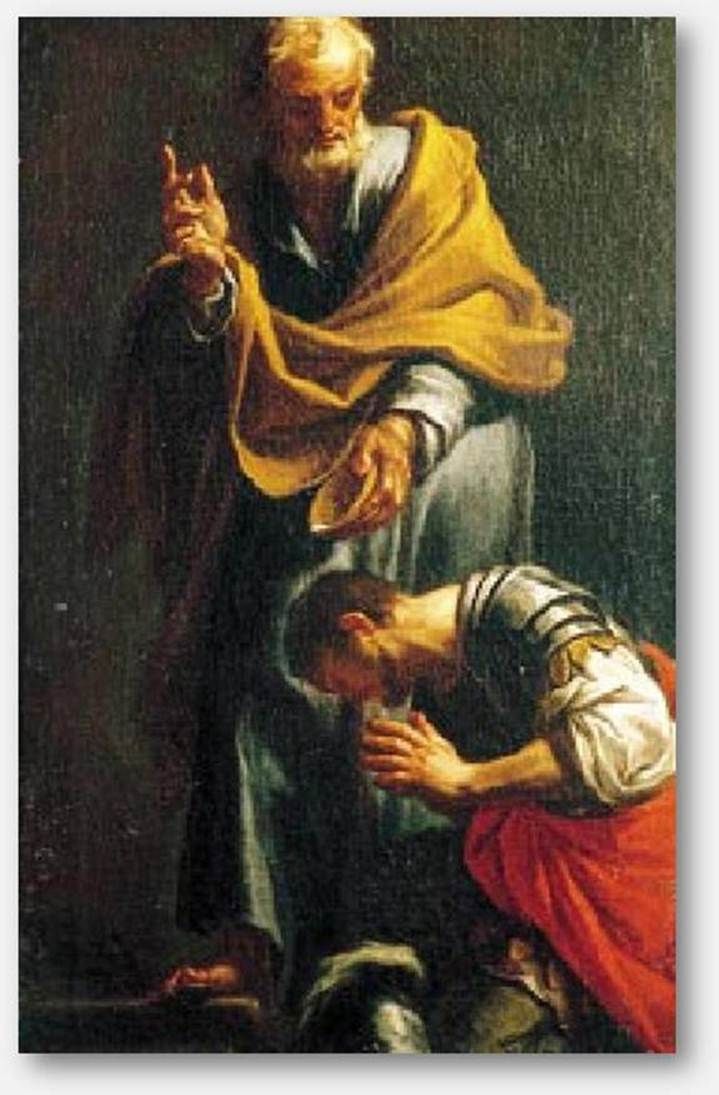 Cornelius. We can barely imagine how difficult this was for Peter. A good Jew never entered a Gentile home, lest he be defiled. But Peter broke the tabu, went to Cornelius’ home and baptized him and his family. He came over to Paul’s point of view, as did the rest of the Apostles at their Council in Jerusalem Acts 15 – which also set the conciliar pattern for the Church which remains today in Orthodoxy.
Cornelius. We can barely imagine how difficult this was for Peter. A good Jew never entered a Gentile home, lest he be defiled. But Peter broke the tabu, went to Cornelius’ home and baptized him and his family. He came over to Paul’s point of view, as did the rest of the Apostles at their Council in Jerusalem Acts 15 – which also set the conciliar pattern for the Church which remains today in Orthodoxy.
Paul was right. If Peter’s original view had prevailed the Church would have remained a Jewish sect, an eccentric kind of Judaism, narrow, inaccessible to the world. Because Paul won, the Church was able to reach out to the world and become multi-ethnic, what we are now – a universal and Catholic Church, for all of any background who believe in Jesus Christ and hold to the Faith.
But that didn’t quite settle the issue, at least not as far as Paul was concerned. He wrote of the time when he thought Peter was backtracking on the principle, and these two Apostles had a big public argument in Antioch. Paul said that before them all he had accused Peter of being two faced (wow!), playing a Jew among the Jews and a Gentile among the Gentiles. Galatians 2:11–14 Could Paul have handled this better? And knowing Peter’s impulsive nature I think we may assume he had something to say, too. Later there must have been apologies, for they made up
A Difference rarely noted
Peter was married. One of Christ’s early miracles was to heal 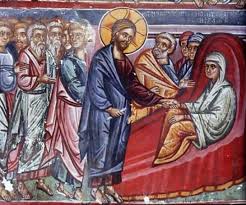 Peter’s mother in law of a fever. Matthew 8:14–15, Mark 1:29–31, Luke 4:38–41 Paul wrote that Peter and the other Apostles traveled with their wives. 1 Corinthians 9:5 We don’t know Peter’s wife’s name or whether they had children. (I saw an icon of the two of them, but her image was entirely fanciful. Nobody knows.)
Peter’s mother in law of a fever. Matthew 8:14–15, Mark 1:29–31, Luke 4:38–41 Paul wrote that Peter and the other Apostles traveled with their wives. 1 Corinthians 9:5 We don’t know Peter’s wife’s name or whether they had children. (I saw an icon of the two of them, but her image was entirely fanciful. Nobody knows.)
Orthodox Christians do not see Peter as the first Pope, certainly not in the modern sense. (We’ll talk about that on another occasion.) Nevertheless, I can’t help seeing this image, translated into today: The airplane lands, the door opens and then emerge two figures, His Holiness Pope Francis and his wife. And maybe Francis’ mother in law would come along, too.
Paul never married, and it appears that at first he didn’t think much of marriage. He said he wished all could be like him, but it was better to marry than to burn with passion. 1 Corinthians 7:9 Not much of a theology of marriage. But he learned the value of marriage, for later he used marriage as an image of the Kingdom. He says the unending love of husband and wife are symbols, signs of the eternal love between Christ and the Church. Ephesians 5:21-33 We hear that passage at every wedding. (Please listen to it carefully: it says not only that wives should be subject to their husbands, but also that each should be subject to the other.)
United in Life
Really, one thing and one thing only united these two Apostles: Both gave their lives to the Lord Jesus and the Church. Both 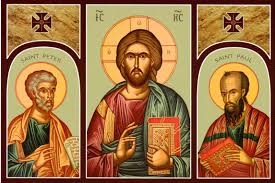 gave up social standing, both were expelled from the synagog, kicked out of Judaism. Both spent the rest of their lives traveling from place to place like their Lord Jesus who said he had nowhere to lay his head, no earthly home. And they handled it. Both obviously were strong men.
gave up social standing, both were expelled from the synagog, kicked out of Judaism. Both spent the rest of their lives traveling from place to place like their Lord Jesus who said he had nowhere to lay his head, no earthly home. And they handled it. Both obviously were strong men.
Well, there was also something else: Both these strong men learned that being strong isn’t enough. Paul mentioned his “thorn in the flesh.” – a physical infirmity? a particular sin, temptation or weakness? we don’t know – which, despite his begging, God had not taken away. Paul thought it hindered his apostolic work. Later he felt the same way when he was in prison. How could the Gospel spread if he wasn’t out there doing it. (A bit of pride here?) But then he learned: His courage in going to prison for confessing Christ, probably also his courage in going on despite his “thorn in the flesh” – that was his greatest witness to the Gospel. He said God taught him, “My grace is sufficient for you, for my strength is made perfect in weakness”. So now he wrote, “I boast about my infirmities so that the power of Christ may rest upon me.” 2 Corinthians 12:9
You know Peter’s weakness: his impetuosity, his big mouth, his instability of purpose. Father Pat Reardon says the only time Peter was truly like a rock was that night on the Sea of Galilee when he tried to walk on water and then sank like a rock! On Holy Thursday night he promised that even if the others fell away he would go with Christ to death; then before dawn he denied three times that he even knew him. So in that beautiful, terrible 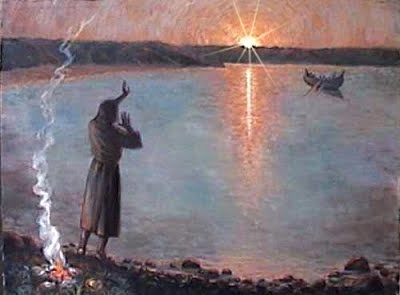 Resurrection appearance at dawn on the beach, when the risen Lord asked Peter, “Do you love me more than these?” “Do you love me?” “Do you love me?” It must have cut him to the core. But then he accepted Christ’s reproach and forgiveness, and moved ahead. I guess that made Peter and Paul strong men in another way – strong enough to face up to their weaknesses. They both accepted the fact that God often works more through our weaknesses and failings than through our strengths. We all need to learn that.
Resurrection appearance at dawn on the beach, when the risen Lord asked Peter, “Do you love me more than these?” “Do you love me?” “Do you love me?” It must have cut him to the core. But then he accepted Christ’s reproach and forgiveness, and moved ahead. I guess that made Peter and Paul strong men in another way – strong enough to face up to their weaknesses. They both accepted the fact that God often works more through our weaknesses and failings than through our strengths. We all need to learn that.
Peter founded the church in Antioch, and Paul soon joined him, brought there by Barnabas. It was from Antioch that Paul was sent out on his great missionary journeys. We at Saint Nicholas, Cedarburg, feel a special connection to the Apostles Peter and Paul, for they are patron saints of the Patriarchate of Antioch to which we belong, through our being part of the Antiochian Archdiocese of North American. Our Metropolitan Philip (of blessed memory +) used to proclaim, “Come home, America! Come home to the Faith of Peter and Paul!”
United in Death
And in the end God, with some help from the crazy emperor Nero, united these two very different men in martyrdom in the same city at the same time – tradition says on the same day, June 29. Peter was in Rome, probably overseeing the Church there. Paul had been arrested, had appealed to Caesar for justice (he must not have known much about Nero!) and was in prison in Rome awaiting trial. In the year 64 much of the city was destroyed by fire. (This was when, as the story went, “Nero fiddled while 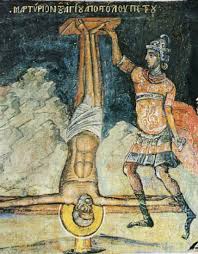 Rome burned”.) Rumor had it that Nero’s men had set the fire – so he made scapegoats of Christians, a small unpopular minority.
Rome burned”.) Rumor had it that Nero’s men had set the fire – so he made scapegoats of Christians, a small unpopular minority.
This was the first systematic persecution of Christians in Rome. Many were imprisoned and killed. For the entertainment of guests at his garden parties, Nero burnt Christians at the stake. He executed the leaders: Peter by crucifixion on Vatican Hill at the site of today’s Saint Peter’s Basilica. Tradition says he asked to be crucified upside down – left: Lord, have mercy – since he had denied Christ and was unworthy to die as his Lord had. Paul was beheaded outside the city on the road to Ostia, the port of Rome. His tomb was rediscovered in 2005 during excavations at the old Saint Paul’s Church Outside the Walls. I’d like to see it, but never will now.
However, I did see Saint Peter. When Khouria Dianna and Jennie and Dave and I were in Rome in 1985 we went to Saint Peter’s Basilica. Most churches and cathedrals in northern Europe seemed to be mostly tourist traps, but Saint Peter’s was a holy place. When I looked down at Peter’s tomb below, hidden inside the niche I began to cry. (I, Father Cool who in those days hardly ever cried. Now that I’m Orthodox, I cry a little better.) And I thought: Dear Peter, dear 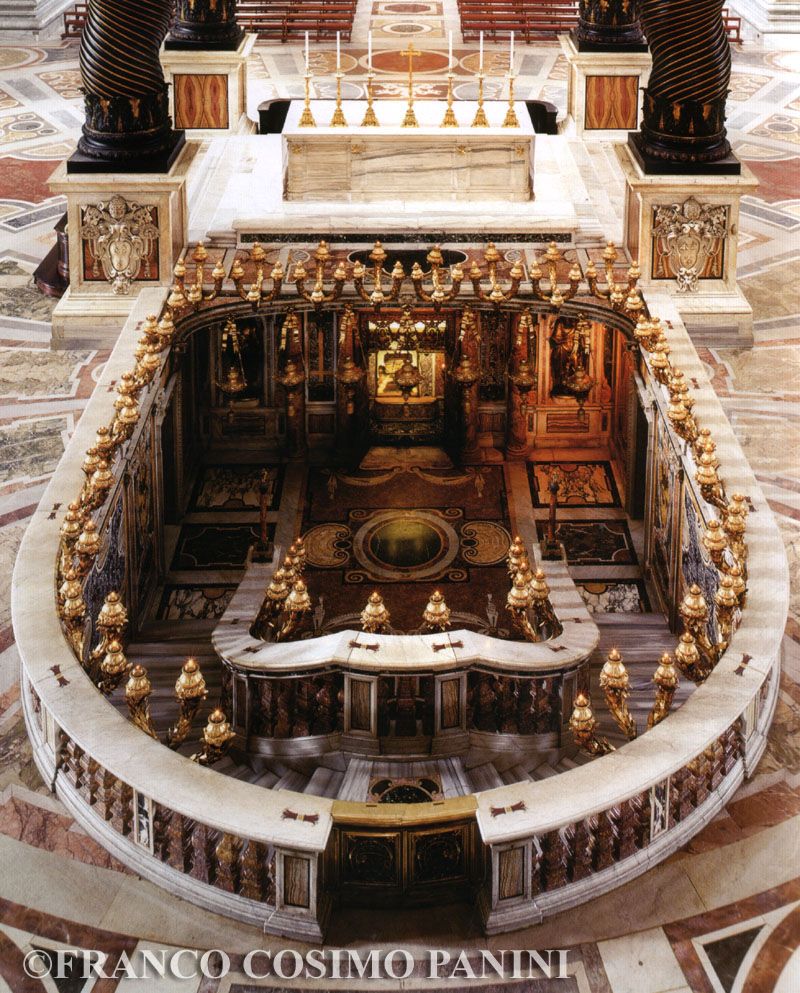 impetuous, fallible, all too human Peter. Look at the eternal Church Christ our God has built on you and your faith. He was right: you turned out to be the Rock.
impetuous, fallible, all too human Peter. Look at the eternal Church Christ our God has built on you and your faith. He was right: you turned out to be the Rock.
Peter and Paul – such different men, once suspicious of each other, sometimes arguing with each other, now embracing, united in Christ, united in Apostleship, united in martyrdom, united in this feast day which they have shared for almost 2000 years now.
The Moral
God uses people of many different back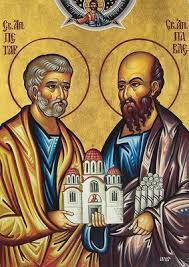 grounds, many different types and temperaments and talents to build his Apostolic Church. We don’t all always get along. All of us like Peter and Paul have our particular strengths and virtues. All of us like Peter and Paul are also weak, and all of us fail him, and all of us like them are sinners and have a lot to learn.
grounds, many different types and temperaments and talents to build his Apostolic Church. We don’t all always get along. All of us like Peter and Paul have our particular strengths and virtues. All of us like Peter and Paul are also weak, and all of us fail him, and all of us like them are sinners and have a lot to learn.
That didn’t stop the Lord Jesus then. It certainly won’t stop him now. For this is still the Church built on the Faith of Peter and Paul, the Church built, as Paul wrote, “on the foundation of the Apostles and prophets with Jesus Christ himself as the chief cornerstone.” Ephesians 2:20
Next Week: Elder Paisios of Athos
Week after next: Last of the Seven Deadly Sins – Envy
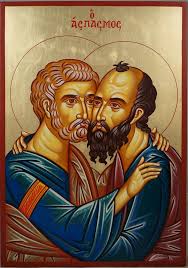
Clarence Jordan, a Protestant civil-rights activist of the mid-Twentieth Century who founded what eventually became Habitat for Humanity, wrote a partial translation (or rather paraphrase, but he made it directly from the Greek) of the New Testament called The Cottonpatch Gospel in which Peter is “Rock Johnson”, Joseph “Joe Davidson”, and so on, and the action is transposed to the American South. (I think Jews and Gentiles also became Blacks and Whites, or maybe the other way around.) Although probably more the Gospel of Clarence Jordan than of Matthew etc., it certainly made me think about the NT world in ways I previously hadn’t, back in the early ’80s.
I heard of the book 50 years ago but never read it. I wonder if I stole the idea from there.
Father, I am from India and a member of the Malankara Orthodox Church , a part of the Oriental Orthodox Church. I love your blogs. They teach me a lot and make me think, ponder and sometimes chuckle. God bless you…And may you have many many more years of blogging….
Thank you! God bless you.